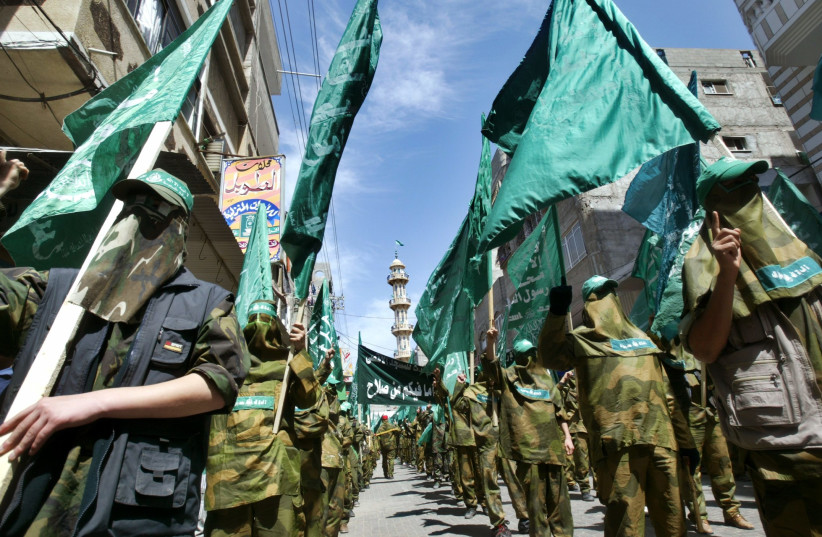Commanders for Israel’s Security (CIS) has proposed to the government war cabinet to offer Hamas’s leadership expulsion, along with Palestinian security prisoners, in exchange for a return of their Israeli hostages.
Former IDF deputy chief Maj. Gen. and CIS chief (the group includes over 500 top former defense and intelligence officials ) Matan Vilnai clarified to the Jerusalem Post that there are significant details of the offer which the government would still need to iron out itself.
For example, when Israel offered a similar deal to PLO Chief Yasir Arafat in Lebanon in 1982, many thousands of his fighters were given free passage-expelled along with him.
Vilnai told the Post that how many Hamas officials would be given free passage out of Gaza, whether 10, 100, or thousands, was something the war cabinet would need to think through.
Further, Vilnai said to the Post that the war cabinet would need to decide whether Islamic Jihad leaders and terrorists would be included in the free passage-expulsion deal.

But generally he stated the point of CIS making the recommendation to the war cabinet was to help resolve the contradictory goals of defeating Hamas along with rescuing the hostages.
According to Vilnai, it has become clearer that a large number of the hostages will not survive absent some kind of deal, and the suggested deal would still broadly fulfill Israel’s pre-war goals of dismantling Hamas in Gaza, though the organization would continue to exist in exile.
Despite the additional details which would require clarity, the fact that the recommendation included releasing and expelling “all Palestinian security prisoners” would mean that some thousands of Palestinians would need to be allowed to leave.
While the recommendation only says expulsion to a third country, Qatar, Turkey, Iran, and a variety of other Middle East countries have ties to Hamas and Islamic Jihad and would likely be ready to accept a large influx of terrorists in the event of such a deal.
In the proposal, CIS wrote that, “Israel should declare that upon acceptance of these terms and receipt of a complete list of hostages: The gates of Gaza will be open to unlimited humanitarian assistance, while weapon smuggling will be strictly prevented,” and that “during the Interim Period that follows intensive fighting, the IDF will deploy in a manner that enables Gaza reconstruction.”
Further, CISS stated that, “Israel will cooperate with and assist an international, Arab-regional, and Palestinian effort to establish a mechanism that will assume responsibility for the management, demilitarization and rehabilitation of the Strip, all under U.S. leadership.”
Without getting into whether the rest of the recommendation might be acceptable to either Israel or Hamas, this last item is already a serious source of tension between current Prime Minister Benjamin Netanyahu and the Biden administration.
The Biden administration wants the Palestinian Authority, however “revitalized,” to take a key role in running Gaza at some point, whereas Netanyahu stridently opposes this.
CIS does not discuss how to resolve this tension, but seems to lean toward accepting American directives on that specific issue.
Next, CIS said that if Hamas accepts the offer, Israel will have achieved:
- The return of all of the hostages
- Achieving the war objectives of eliminating Hamas governance and its military capacity
- Ending the war
- Improved prospects of mobilizing regional and international engagement in implementing the stages of the ‘day after’ strategy
- [And, according to the Shin Bet director, the hunt for those responsible and the perpetrators will continue in the tradition of the Munich precedent]
Even if Hamas rejects the offer, which CIS finds a more likely scenario due to the radical philosophy of its leaders, CIS said Israel will still:
- Ease pressure for a premature ceasefire
- Demonstrate to the hostages’ families and the Israeli public that the government is taking the initiative and does not rule out any option for returning the hostages
Some of the underlying assumptions of this gambit are that “Israel cannot maintain normal life with Hamas on our southern border” and that “Sinwar and his top associates are not expected to surrender, regardless of the price the population – including Hamas activists – pay.”
Moreover, with “every passing week, mounting civilian casualties and worsening humanitarian distress will increase international pressure and attempts to impose a premature ceasefire; Israel’s rejection of an imposed ceasefire is liable to create a crisis with the Biden administration and others.”
In addition, CIS wrote that “should senior Hamas leaders survive the war and residual organizational and military capacity remain, the potential for the revival of the threat to Israel’s security must be considered,” with CIS anticipating that “Hamas’s leadership removal from the Strip will improve the prospects of preventing the revival of the organization in the Strip.”
Also, CIS took into account that Hamas’s leadership may now be more focused on its survival long-term than just getting back security prisoners and that pressure from the US to conclude the war could block Israel from achieving any of its primary goals, absent a deal.
Other top officials supporting CIS include: Tamir Pardo and Danny Yatom, former directors of the Mossad, Nadav Argaman and Ami Ayalon, former directors of the Shin Bet, Uzi Arad, former National Security Council Chief, Aharon Ze’evi-Farkash, Maj. Gen. (res.), former Head IDF intelligence, and Nitzan Alon, Maj. Gen. (res.), former Commander of the Central Command.
Vilnai clarified to the Post that due to the fact that Alon is currently working with the government and defense establishment on the hostages issue, he is on hiatus from CIS and was not able to be involved with the current recommendation.
